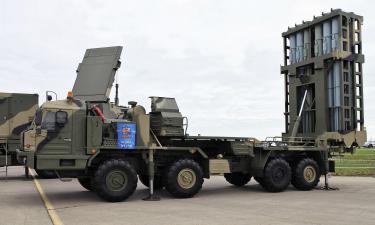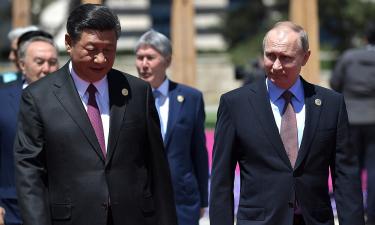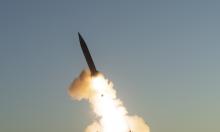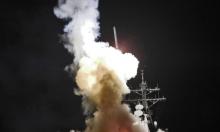CIS Summit: Will Russia play its role of a strong and dominating power?
The summit of the Commonwealth of Independent States (CIS) was a formality, but the issue at hand is the security of the Russian Federation. Moscow needs to change its attitude towards its neighbours before it is too late.
The following leaders attended the CIS summit at the personal invitation from Russian President Vladimir Putin:
- President of Azerbaijan Ilham Aliyev,
- Prime Minister of Armenia Nikol Pashinyan,
- President of Belarus Alexander Lukashenko,
- President of Kyrgyzstan Sadyr Japarov,
- President of Tajikistan Emomali Rahmon,
- President of Turkmenistan Serdar Berdimuhamedov,
- President of Uzbekistan Shavkat Mirziyoyev.
Moldovan President Maia Sandu did not attend.
The summit agenda included "current regional international issues, security issues, as well as steps to increase the activity of the organization, its executive structures, and industry bodies."
The main document released was called "Appeal of the Heads of State of the Commonwealth of Independent States to the Peoples of the Commonwealth Countries and the World Community in Connection with the 80th Anniversary of the Victory of the Soviet People in the Great Patriotic War of 1941-1945."
The document speaks of the need to "prevent the revival of fascism, Nazism, militarism, and to suppress attempts to unleash a new world war." It also condemns "attempts to place equal responsibility on the Soviet Union and Nazi Germany for unleashing the war." Such attempts are "immoral and blasphemous in relation to the memory of the liberators of the world from the "brown plague".
The CIS leaders called for "condemning and not allowing the falsification of history, resolutely opposing the justification and glorification of Nazi, fascist and similar nationalist movements, their followers."
An excellent resolution, but what about attempts to rehabilitate accomplices of Nazism — members of the "Turkestan Legion" in Uzbekistan, Kyrgyzstan and Kazakhstan?
Deradicalization is a myth
The second important document, authored by Uzbekistan, was called "On the Program of Cooperation of Member States of the Commonwealth of Independent States in the Field of Deradicalization for 2025-2027".
The document stressed out the need for "establishing systemic interaction between CIS special services and taking coordinated measures to ensure cybersecurity". It appears that "interaction between special services" stands for the pseudo-religious aspect.
Meanwhile, radicalization is in full swing:
- in Kazakhstan there was "Kantar",
- Islamists from Tajikistan staged a bloodbath at Moscow's Crocus City Hall,
- supporters of the radical Islamist organization Tablig Jamaat*, officially banned and recognized as extremist in Russia, Tajikistan, Uzbekistan and Kazakhstan, have their seats in the parliament of Kyrgyzstan.
Parity is good, but it is not realpolitik
All experts from the CIS countries claim that they do not want Russia to dominate them. Of course, parity is good, but Russia dominates in terms of economic weight, resources, military component and other criteria that actually exclude parity.
Many may wonder what Russia may want from Armenia, Kazakhstan, etc. Experts say that it is difficult for pro-Russian forces to work there without knowing Moscow's goals, not to mention the lack of legal support.
Meanwhile, NATO intelligence agencies actively drag Armenia, Moldova, Kazakhstan, etc. into confrontation with the Russian Federation, including through radicalism, extremism, nationalism, fascism.
Western intelligence agencies actively promote their agents in all public and state institutions of Russia's neighbouring states to exert direct influence on their political, economic, social and cultural processes.
There is an irreversible process going on to replace older people in governments, who were born in the USSR, with younger, Western-oriented politicians who can hardly speak Russian. The Russian-speaking space within the CIS has been inexorably shrinking. The further this process goes, the less chance the CIS has to survive.
For the sake of its own security, Russia should do the following:
- Train promising politicians and political strategists in Russia. Perhaps our billionaires should not support sports clubs, but pro-Russian managers.
- Promote large joint integration projects. Why did Kazakhstan refuse to build a nuclear power plant with Rosatom and preferred an international consortium instead? Are there Russian lobbyists in the Parliament of Kazakhstan? Israel has a lot of NGOs and NPOs in the US, whose members communicate with congressmen during election campaigns and ask them what they have done for the common cause of Western civilization. If there is a congressman who refuses to cooperate, their prospects as a politician become questionable.
- Create shadow cabinets aimed at seizing power in neighbouring countries should the West launches a "color revolution" there.
Russia's CIS neighbours should have a clear idea that their desire to join NATO would mean a step beyond the red line. All economic benefits and joint projects should be cut, sanctions be imposed and shadow cabinets be brought to power not to let this happen.
Russia's foreign and domestic policies have been changing tremendously lately. It is time for Russia to act as a strong power that controls its borders and its security.
*an organization recognized as extremist, banned in Russia
Details
The Commonwealth
Subscribe to Pravda.Ru Telegram channel, Facebook, RSS!




